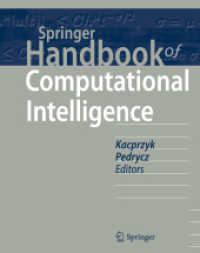- ホーム
- > 洋書
- > 英文書
- > Politics / International Relations
Full Description
This book offers a detailed examination of the effectiveness of the peacekeeping operations of the African Union.
Despite its growing reputation in peacekeeping and its status as the oldest continental peacekeeper, the performance of the African Union (AU) has hitherto not been assessed. This book fills that gap and analyses six case studies: Burundi, Comoros, Somalia, Mali, Darfur and the Central African Republic. From a methodological perspective it takes a problem-solving approach and utilises process tracing in its analysis, with its standard for success resting on achieving negative peace (the cessation of violence and provision of security). Theoretically, this study offers a comprehensive list of factors drawn from peace literature and field experience which influence the outcome of peacekeeping. Beyond the major issues, such as funding, international collaboration and mandate, this work also examines the impact of largely ignored factors such as force integrity and territory size. The book modifies the claim of peace literature on what matters for success and advocates the indispensability of domestic elite cooperation, local initiative and international political will. It recognises the necessity of factors such as lead state and force integrity for certain peace operations. In bringing these factors together, this study expands the peacekeeping debate on what matters for stability in conflict areas.
This book will be of much interest to students of peacekeeping, African politics, war and conflict studies, and International Relations in general.
Contents
PART I: Making a Case for Building Negative Peace 1. Introduction 2. Deducing the factors that matter PART II: Lessons from Successful Operations 3. Burundi (2003-2004): Plugging the gap when funding and mandate fail 4. The Comoros (2003-2008): When external and local factors working in harmony 5. Somalia (2007 til date): Contingent character makes the difference 6. Mali (2013): A foreign lead state to the rescue PART III: Lessons From Failed Operations 7. Darfur (2004 til date): When elites connive against keeping the peace 8. The Central African Republic (2013-2014): When political elites and citizens fail Conclusions: Factors that matter and how they interact







